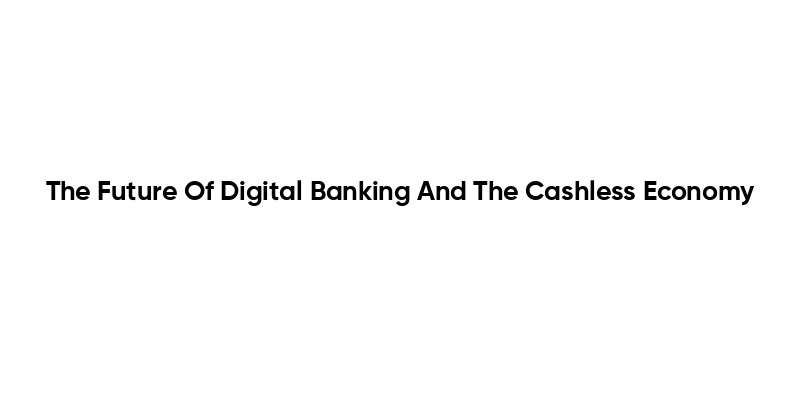The future of digital banking and the cashless economy is rapidly evolving, driven by technological advancements and changing consumer behaviors. As we move towards a more interconnected world, the reliance on traditional banking methods is diminishing, paving the way for innovative financial solutions. This transformation is not just about convenience; it represents a fundamental shift in how we perceive and manage money. In this article, we will delve into the key trends shaping the future of digital banking, including mobile payments, blockchain technology, and the rise of fintech companies.
In the following sections, readers will discover how digital banking is enhancing customer experiences through personalized services and seamless transactions. We will explore the implications of a cashless society, examining both the benefits and challenges it presents to consumers and businesses alike. Additionally, we will discuss the role of security and privacy in this new financial landscape, ensuring that you are well-informed about the potential risks and rewards of embracing a cashless economy.
As we navigate through this exciting journey into the future of finance, we invite you to join us in exploring the innovations that are redefining banking as we know it. Whether you are a consumer eager to understand the latest payment technologies or a business owner looking to adapt to the changing financial environment, this article will provide valuable insights and practical knowledge. Stay with us as we uncover the future of digital banking and the cashless economy!
The Rise of Mobile Banking Applications
Mobile banking applications have revolutionized the way consumers interact with their financial institutions. With the increasing penetration of smartphones, users can now manage their finances on-the-go, making transactions, checking balances, and even applying for loans directly from their devices. This convenience has led to a significant rise in mobile banking adoption, particularly among younger generations who prioritize digital solutions over traditional banking methods.
Moreover, mobile banking apps are continuously evolving, incorporating advanced features such as biometric authentication, AI-driven financial advice, and personalized budgeting tools. These innovations not only enhance user experience but also improve security, making digital banking a more attractive option for consumers. As a result, financial institutions are investing heavily in mobile technology to stay competitive in the cashless economy.
The Impact of Blockchain Technology
Blockchain technology is poised to transform the landscape of digital banking and the cashless economy. By providing a decentralized and secure method for recording transactions, blockchain can enhance transparency and reduce fraud. Financial institutions are exploring the use of blockchain for various applications, including cross-border payments, smart contracts, and identity verification.
Additionally, the rise of cryptocurrencies, which are built on blockchain technology, is challenging traditional banking systems. As more consumers adopt digital currencies, banks must adapt to this new reality by integrating cryptocurrency services into their offerings. This shift could lead to a more inclusive financial ecosystem, where individuals have greater control over their assets and transactions.
The Role of Artificial Intelligence in Banking
Artificial intelligence (AI) is becoming an integral part of digital banking, enhancing customer service and operational efficiency. AI-powered chatbots and virtual assistants are now commonplace, providing customers with instant support and personalized recommendations. This technology not only improves user satisfaction but also reduces operational costs for banks.
Furthermore, AI is being utilized for fraud detection and risk management. By analyzing vast amounts of data in real-time, AI algorithms can identify suspicious activities and alert banks to potential threats. As the cashless economy continues to grow, the importance of AI in safeguarding financial transactions will only increase, making it a critical component of future banking strategies.
Regulatory Challenges and Compliance
The transition to a cashless economy presents several regulatory challenges for digital banking. Governments and regulatory bodies must establish frameworks that ensure consumer protection, data privacy, and financial stability. As digital transactions become more prevalent, the need for robust regulations to prevent money laundering, fraud, and cybercrime becomes paramount.
Moreover, banks must navigate the complexities of compliance with various regulations across different jurisdictions. This can be particularly challenging for fintech companies that operate globally. As the digital banking landscape evolves, collaboration between financial institutions and regulators will be essential to create a secure and efficient cashless economy.
The Future of Payment Systems
The future of payment systems is rapidly changing, with innovations such as contactless payments, digital wallets, and peer-to-peer transfer platforms gaining popularity. These technologies are making transactions faster and more convenient, catering to the demands of a tech-savvy consumer base. As a result, traditional payment methods are being phased out in favor of digital solutions.
Additionally, the integration of payment systems with social media and e-commerce platforms is creating new opportunities for businesses and consumers alike. As the cashless economy continues to expand, we can expect to see further advancements in payment technologies, including the potential for central bank digital currencies (CBDCs) that could reshape the financial landscape.




